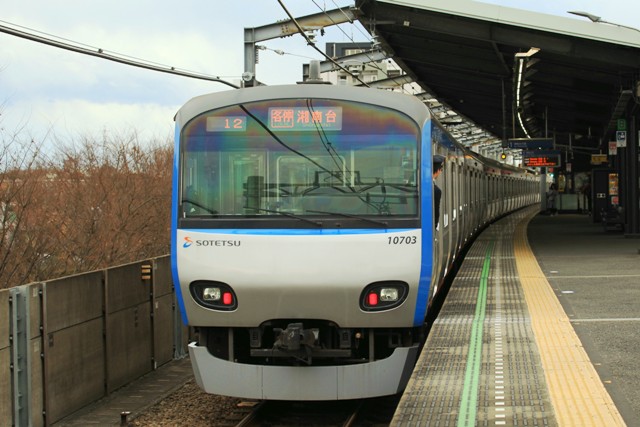EMU Sotetsu 10000 series arrives at Izumi-chuo station on the Sotetsu-Izumino line
Sagami Railway (Sotetsu) is known as a Yokohama-based private railway company. Starting from Yokohama, the main city in Kanagawa Prefecture, Sotetsu has a 35.9 kilometer-long railway network. The track is double. The electric system is 1,500 V DC overhead. The gauge size is 1,067 millimeters.
The EMU 10000 series is one of Sotetsu's main fleets. It was launched in 2002 to replace old models such as the 2100 and the 6000 series. A total of 8 sets, 70 units, were built by Tokyu Sharyo (present J-TREC) and JR East Niitsu factory. To reduce the manufacturing cost, the 10000 series has common specifications with those of JR East's EMU E231 series. For instance, the interior of the 10000 series is basically the same as that of the E231 series. TIMS (Train Information Management System) is introduced in both the 10000 and the E231 series. Furthermore, the electric control system is common between two models, namely IPM-IGBT VVVF (variable-frequency drive) inverter system.
The one set of the 10000 series train is composed of 10 or 8 cars. MT ratio (the ratio of the number of motorcars to the trailers) is 1 (5M5T or 4M4T). They are operated on both the main line (Yokohama - Ebina) and the Izumino line (Futamatagawa - Shonandai).
What's new with this commuter train? Only minor changes were conducted such as the change of body stripe colors and setting up of the women-only passenger cars. The EMU Sotetsu 10000 series will continue to be a major fleet of the Sotetsu rolling stock.
The EMU 10000 series is one of Sotetsu's main fleets. It was launched in 2002 to replace old models such as the 2100 and the 6000 series. A total of 8 sets, 70 units, were built by Tokyu Sharyo (present J-TREC) and JR East Niitsu factory. To reduce the manufacturing cost, the 10000 series has common specifications with those of JR East's EMU E231 series. For instance, the interior of the 10000 series is basically the same as that of the E231 series. TIMS (Train Information Management System) is introduced in both the 10000 and the E231 series. Furthermore, the electric control system is common between two models, namely IPM-IGBT VVVF (variable-frequency drive) inverter system.
The one set of the 10000 series train is composed of 10 or 8 cars. MT ratio (the ratio of the number of motorcars to the trailers) is 1 (5M5T or 4M4T). They are operated on both the main line (Yokohama - Ebina) and the Izumino line (Futamatagawa - Shonandai).
What's new with this commuter train? Only minor changes were conducted such as the change of body stripe colors and setting up of the women-only passenger cars. The EMU Sotetsu 10000 series will continue to be a major fleet of the Sotetsu rolling stock.
Official information about the Sotetsu trains (in Japanese):

